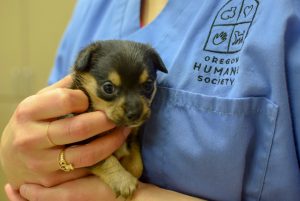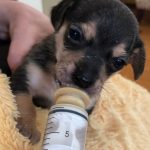OHS and foster parents work together to save a fragile group of newborn puppies
 There is a special group of foster parents that help care for the smallest and most fragile pets who come to OHS. The pets are known as “bottle babies” because they are not able to nurse and rely entirely on being bottle fed. This situation can happen for a number of reasons. For example, the mom gets sick and is not able to nurse; the litter is too large for the mom to feed all the babies; or the babies are separated from mom too soon. Whatever the reason, a highly-skilled group of OHS foster parents are ready to answer the call when bottle babies arrive at the shelter.
There is a special group of foster parents that help care for the smallest and most fragile pets who come to OHS. The pets are known as “bottle babies” because they are not able to nurse and rely entirely on being bottle fed. This situation can happen for a number of reasons. For example, the mom gets sick and is not able to nurse; the litter is too large for the mom to feed all the babies; or the babies are separated from mom too soon. Whatever the reason, a highly-skilled group of OHS foster parents are ready to answer the call when bottle babies arrive at the shelter.
When a group of seven one-week old puppies were brought to OHS recently, the situation was critical. Their mom was diagnosed with a severe calcium deficiency and she was no longer able to nurse. The dog and puppies were owned by a local family who reached out to OHS for help. They rushed the puppies to OHS while they focused on helping their dog recovery from this medical emergency.
Lisa Stevens was one of the OHS foster parents who stepped up to help. While this was her first time caring for bottle babies, she has experience caring for newborn puppies and moms.
Lisa took two of the puppies home and immediately connected with other foster parents who had experience bottle feeding. It was exhausting work. “The first few days, I set my alarm every two hours to get up and feed them” says Lisa. Getting the puppies to eat was particularly challenging because they didn’t take to the bottle. Lisa turned into a “bottle baby detective” and researched some creative solutions. Through trial and error she finally found a set-up that worked. She attached a piece of a make-up sponge to the end of a syringe and slowly pumped formula to the makeshift nipple. Lisa breathed a huge sigh of relief when the tiny puppies started sucking the formula out of the sponge. “Since I wasn’t sure how well they had been fed before they came to me, I was particularly eager to get them to eat.”
Puppies this small need help with everything, including going to the bathroom. “You need to be extra careful about keeping them clean since urine and formula can irritate their delicate skin,” added Lisa.
The puppies are now three weeks old and consistently eating and gaining weight. Lisa has daily contact with the foster parents who are caring for the other puppies in the litter which helps keep her going. “It’s a lot more work than people realize,” says Lisa. “But the experience is so rewarding and I’m grateful to play a part in saving these precious lives.”













